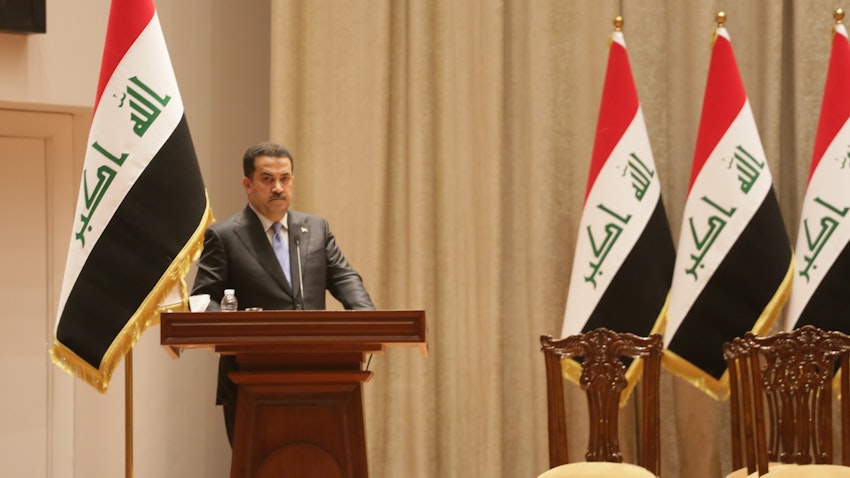عربيفارسی
Mar. 22, 2023

Iraqi Prime Minister Muhammad Shia’ Al-Sudani addresses the parliament in Baghdad, Iraq on Oct. 27, 2022. (Photo via Getty Images)
The story: After extensive discussions, Iraq’s Council of Ministers has submitted a draft budget law for 2023 to the parliament. The move is the first major legislative effort by the administration of Prime Minister Muhammad Shia’ Al-Sudani, who took office in Oct. 2022.
Iraq did not pass a budget last year amid the lengthy government formation process following the Oct. 2021 parliamentary polls. The budget bill provides the Sudani administration with a chance to address pressing concerns about the economy, unemployment, and relations with Erbil.
The coverage: The new budget, which the government says will support stability by being repeated over the next three years, outlines annual spending of 198.7T IQD (152.8B USD). Deficits of 64.1T IQD (49.3B USD) are projected for each year. These figures represent a record for both deficits and spending.
- Iraq relies on oil for the vast majority of its government revenue. The new budget projects average daily crude exports of 3.5M barrels at 70 USD per barrel.
- A major portion of the spending—around 88T IQD (68B USD)—is allocated to public sector salaries and social benefits. This has greatly contributed to the record size of the budget.
- The draft legislation authorizes 49.4T IQD (38B USD) per year in investment spending, but past experience shows that this goal is rarely met.
Importantly, the budget addresses longstanding disagreements between Baghdad and the Kurdistan Regional Government (KRG) over budget shares and hydrocarbon revenues.
- The KRG’s share of the budget will remain at 12.67%, as set in the 2019 federal budget.
- A new joint account will be set up to hold income from 400,000 barrels of oil per day (bpd) that the Kurdistan region is expected to produce. Control of this account may be the biggest sticking point in terms of implementation.
- The KRG has also been given a sweetener of 400B IQD (308M USD) for public sector salaries. The transfer was made in the form of a “loan” to get around a Federal Supreme Court decision that labeled previous extra-budgetary transfers as going against the 2021 budget law.
The budget has gone to the parliament for debate and passage, a process which should take weeks but could go on for longer if there are requests for major changes.
The context/analysis: The Sudani administration’s submission of the draft budget to the parliament is a welcome development, particularly after the absence of a budget last year.
- The draft is being presented as covering the next three years—2023, 2024 and 2025—with the government citing authorization under the Financial Management Law of 2019.
- Sudani has said that the ministries of finance and planning can make amendments, but that the passing of a multi-year budget will give the government some much-needed stability and predictability.
Baghdad and the KRG have been at loggerheads for more than a decade over control of Iraqi Kurdistan’s hydrocarbon sector. The federal government seeks greater control while Kurdish authorities look to enshrine their independent oil sales as a protected principle.
- The provision that creates the new joint account is vague and open to interpretation, which could prove problematic for implementation.
- Previous disagreements between Baghdad and Erbil led to the KRG getting less than its designated share of the budget. This has been cited as a reason for the Kurdish regional administration’s inability to paypublic sector salaries on time or in full.
- A KRG source told the Kurdish outlet Rudaw that the joint account will be managed by the Kurdistan regional administration and that the federal government will only be allowed to observe. Baghdad can be expected to have a more robust interpretation of how the arrangement will work.
Sudani is increasing government spending to address concerns about poverty as well as the lack of jobs and access to services. For instance, the budget outlines a new minimum wage of 425,000 IQD (275 USD).
- Public sector jobs have long been used in Iraq as part of partisan patronage networks. The new spending will likely be used as such by political parties to curry favor with voters ahead of the next parliamentary elections.
The future: Given the Shiite Coordination Framework’s (SCF) plurality in the parliament, passage of the legislation is likely in its current form—albeit not guaranteed.
- Implementation will be key, particularly with regard to the Kurdistan region. Past budgets have offered solutions to manage disagreements between Baghdad and Erbil, but these measures have proved inadequate.
- Iraq has myriad economic difficulties including unemployment, poor public services and infrastructure, poverty, and an anemic private sector. Although Sudani has said that the budget addresses those challenges, it is an open question whether this budget will do enough.
- Beyond the questions related to whether the proposed budget will live up to its promises, there are major concerns about the Sudani administration’s ability to fund it in the longer term.
amwaj.media